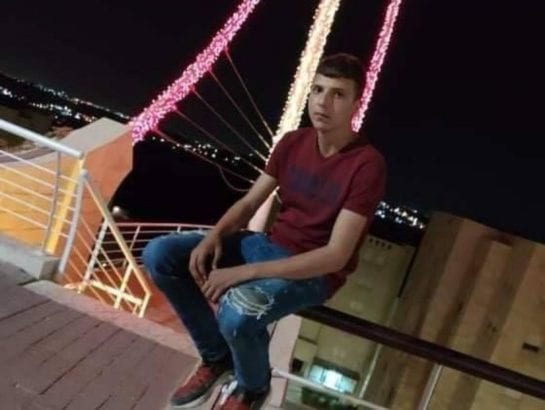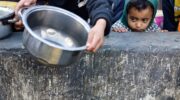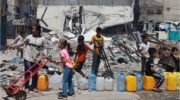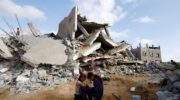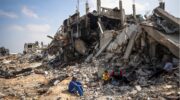Amer Snobar’s friend, who was at the scene, says he was beaten to death by officers wielding clubs. The army denies killing him
By Gideon Levy and Alex Levac, reposted from Ha’aretz
Amer Snobar, a 17-year-old from a down-on-its-luck family in the West Bank village of Yatma, was killed on Saturday night three weeks ago, after midnight. His incident occurred opposite the entrance to Hugo Chavez Hospital in the town of Turmus Ayya, north of Ramallah. Snobar had been helping a friend whose car had broken down. The friend, Sahar Najar, also 17, says that six Israel Police officers emerged from a white van, seized Amer and beat him with clubs until he fell to the ground and died.
Najar accompanied us this week to the site of his friend’s death and reenacted the events. The police van had been trailing them as they pushed the stalled car (with the aid of another vehicle) near the entrance to Turmus Ayya. Najar, wary of any contact with the Israelis, was able to escape and hide behind a nearby building. The van, however, blocked Snobar, and six officers – Najar thinks they were from the Yasam riot police unit – emerged and started to beat him with clubs. The pummeling went on for about 10 minutes. For the first few minutes, Najar heard his friend’s shouts, but then they grew faint and stopped.
The Israel Defense Forces stated the following day that it was their forces that had been pursuing Snobar, but that he apparently tripped or lost consciousness and struck his head, and that that is what caused his death.
At the site where Snobar was killed, on the shoulders of the internal road near the entrance of Turmus Ayya, next to Hugo Chavez Hospital, there is no place where one could fall and be killed by hitting his head, as the army maintains. The IDF also stated that the soldiers summoned an ambulance and tended to Snobar until it arrived. Snobar died in a Palestinian ambulance on the way to the Government Hospital in Ramallah (the Chavez hospital is currently receiving only coronavirus patients). People who saw the body related that there were contusions on the head and chest and that the teenager was covered in blood.
Who killed him? Or, perhaps, what killed him? And why?
The dead youth’s family live in an isolated house in the heart of an olive grove at the edge of Yatma – north of Turmus Ayya – which one arrives at by means of a pothole-ridden dirt road. The house is the epitome of meagerness; flies buzz about in the shabby living room.

The bereaved father, Abd al-Rahim, a tiler of 54 whose permit to work in Israel was immediately revoked when his son was killed – the usual Shin Bet security service procedure with bereaved Palestinian families – and who was left devastated by both those events, is sitting in the living room. His face is a picture of pain and despair. There isn’t one photograph of his dead son in the room. Only a poster outside indicates that this is a house of mourning.
Amer was the eldest child – Abd al-Rahim and his wife, Mohadiya, have another son and four daughters. Amer attended school only until the 8th grade, when he began helping his father provide for the family by collecting scrap metal and selling it. What did he dream of being when he’d grow up? “In this land there are no dreams,” Amer’s uncle, Mahdi Snobar, interjects.
On Saturday evening, October 24, Amer told his father that his friend Sahar had called to say that he needed his help, because his car was stuck. The hour was late, Sahar’s car wasn’t legally owned by him and Abd al-Rahim told his son not to go. But Amer waited until his father dozed off and left. He drove Sahar’s second car, which is also illegal.
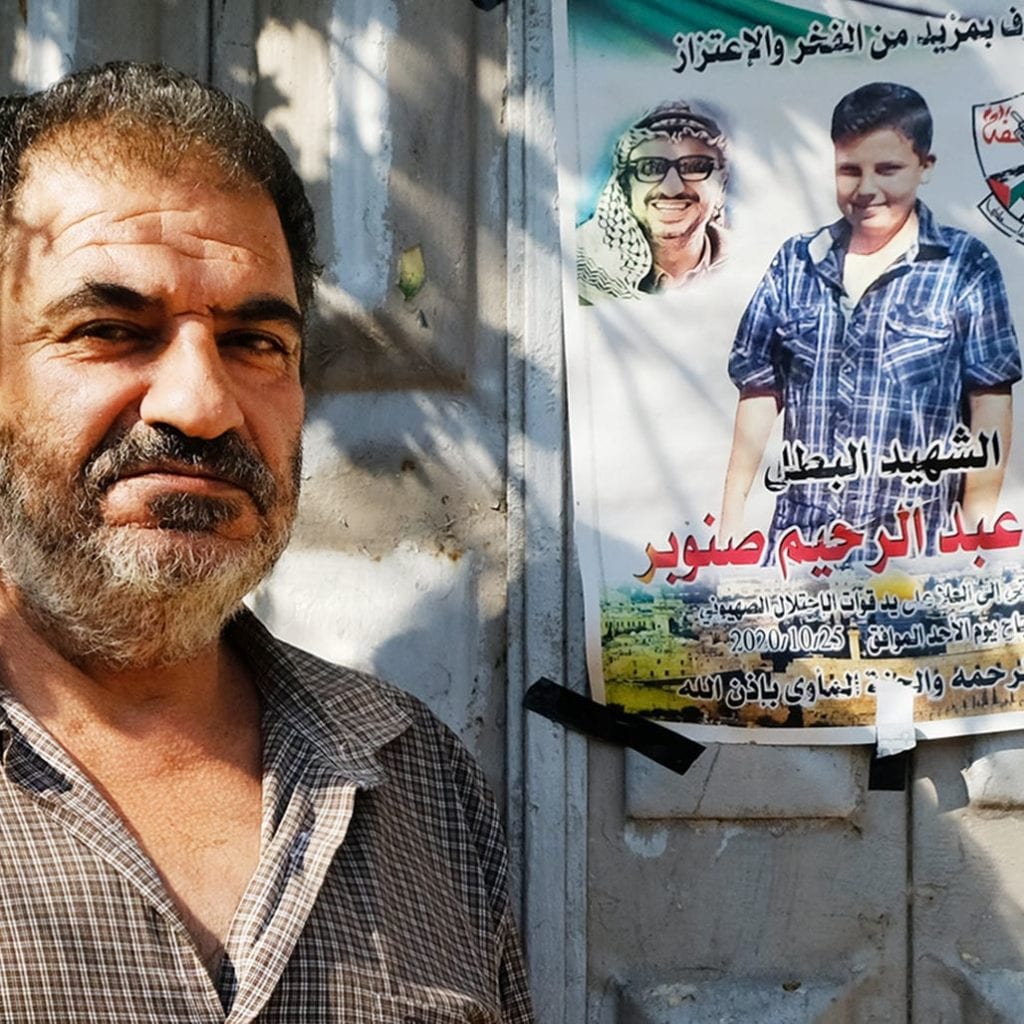
Abd al-Rahim woke up around midnight and Mohadiya told him that Amer had left not long before. He called his son, but there was no response, so he called Sahar, who told him, “Soldiers arrested Amer. I managed to get away.” Sahar said Abd al-Rahim should go quickly to Turmus Ayya, a few minutes’ drive from Yatma, to try to get Amer released. Together with two neighbors, Abd al-Rahim rushed to Turmus Ayya, but by that time there were large army forces at the site who brandished weapons and refused to let them approach.
After about a quarter of an hour, a Palestinian ambulance arrived. The driver told Abd al-Rahim to follow him to the Government Hospital in Ramallah. The paramedic said that Amer was in serious condition, but wouldn’t allow the father to see him inside the ambulance. At the hospital he waited for about 15 minutes before a physician gave him the bitter news. His son was dead. He saw the body, its upper part covered with blood.
“It was a lynching,” Mahdi, the uncle, told us.

The following day, the head of the Arab media division of the IDF Spokesperson’s Unit, Avichay Adraee, published the following post on his Facebook page in Arabic: “Don’t believe the Palestinian lie! The truth about what happened in Turmus Ayya! During the night the security forces operating in the Binyamin region received a report of an Israeli vehicle at which stones were thrown near Turmus Ayya. In response, the army arrived at the scene and started searches to locate the perpetrators. When the forces entered the village, two suspects fled.
“During their flight, one of them fell to the ground and lost consciousness as a result of striking his head. Contrary to Palestinian reports, the young person was never beaten and the army did not approach him before he fell to the ground, but on the contrary, tried to assist him with medical treatment, resuscitation and first aid.” Adraee posted a photograph showing the injured teenager lying on the ground, being treated by Israeli soldiers.
According to Defense for Children International, an autopsy was performed on Amer Snobar’s body at An-Najah National University Hospital in Nablus. The results have not yet been published officially, but the NGO reports that the autopsy concluded that he died of suffocation. It also identified significant contusions and wounds in his chest and stomach, according to the organization.
What, then, happened on that night at the entrance to Turmus Ayya? Only Mustafa, Sahar Najar’s father, was home – in another poverty-stricken dwelling in Yatma – when we visited. He’s been wheelchair-ridden for nine years, since a rock fell on him, crushing his back, while he was herding sheep.
His son hasn’t been home since the night his friend was killed, we’re told. Sahar is deeply traumatized, Mustafa said, and is also afraid to come to the village because of the accusatory looks he gets from the bereaved family of his childhood friend. The Snobar family blames Sahar for having called Amer out of his house late at night and perhaps also for the fact that he succeeded in getting away while his friend was killed.
In the meantime, Sahar is taking refuge in his sister’s house in Mughayyir, a village near Turmus Ayya. At the time of Amer’s funeral, he was under interrogation by the Palestinian police, and he did not visit the Snobars’ mourning tent, for fear of the family’s reaction. He and Amer had been friends since preschool.

We met at the entrance to Hugo Chavez Hospital, where the events occurred. The hospital, with its elegant, modern exterior, was donated by the late president of Venezuela as an ophthalmic center, but currently serves the Palestinian Authority as a hospital for coronavirus patients. (People without face masks could be seen walking about inside the hospital this week.)
Sahar Najar arrives in a tattered T-shirt, looking frightened and stunned. He speaks softly, is sparing in his words, his eyes are red, probably from lack of sleep. We go to stand exactly in the place where his friend fell after being beaten, according to his account. A few steel pipes from a nearby workshop hang from the fence by the roadside where everything happened. The hospital’s gate is directly opposite, across the road.
Najar relates that he left home in his old Peugeot 205, a mashtuba – a vehicle that has been erased from official records and has no license number or insurance, and thus not permitted on the road – at about 8 P.M., on the way to visit his sister. He, too, like his late friend, collects and sells scrap metal. At the entrance to Turmus Ayya the car stalled, and he was unable to start it. He called Amer and asked him to come in his other mashtuba, a Hyundai. Amer took time in arriving, and in the meantime Najar waited in his sister’s house. The stalled car stood at the Turmus Ayya junction, on Highway 60, and the friends decided they would push it into the village and try to start it up there.
They used the Hyundai to push the Peugeot. When they reached the traffic circle at the village’s entrance, they saw an army jeep pass by. Then the police van appeared. As Najar ran to hide behind a nearby building, the van passed Amer and its occupants got out and began hitting him. Najar says he peeked out from behind the wall where he was hiding and saw the policemen (or, apparently, soldiers) beating him with clubs until he collapsed. He heard Amer shouting, “Leave me alone, leave me alone,” until he fell silent.
The IDF Spokesperson’s Unit stated on the day after the incident that the forces arrived on the scene in the wake of a report about stone throwing and about two suspects who were seen fleeing: “Apparently, during their escape, one of the suspects lost consciousness, collapsed and struck his head. He was not hit by IDF forces. The force at the site as well as military medical forces administered first aid to the injured person. Following lengthy efforts at resuscitation, the suspect was pronounced dead. The troops did not come into contact with the suspect before he fell and did not shoot at him.”
This week, the IDF Spokesperson’s Unit issued an expanded statement: “During the night of 25/10, a report was received that stones were thrown at an Israeli vehicle near the village of Turmus Ayya in the area of the Binyamin Territorial Brigade. IDF fighters who were operating in the area sped to the site and launched searches for suspects. As troops entered the outskirts of the village, two suspects began to flee on foot. Apparently, during the flight one of the suspects lost consciousness, collapsed and struck his head. The force at the site and military medical personnel administered first aid to the injured person. Following lengthy resuscitation efforts, the suspect was pronounced dead.
“We emphasize that he was not hit by IDF troops or by other forces at any stage, and the forces’ initial contact with him occurred during the medical treatment he was given.”
The spokeswoman of the Shai (Samaria and Judea) District police, Shlomit Bakshi, stated that no police force was in Turmus Ayya that night.
Gideon Levy is a Haaretz columnist and a member of the newspaper’s editorial board. Levy joined Haaretz in 1982, and spent four years as the newspaper’s deputy editor. He is the author of the weekly Twilight Zone feature, which covers the Israeli occupation in the West Bank and Gaza over the last 25 years, as well as the writer of political editorials for the newspaper. Levy was the recipient of the Euro-Med Journalist Prize for 2008; the Leipzig Freedom Prize in 2001; the Israeli Journalists’ Union Prize in 1997; and The Association of Human Rights in Israel Award for 1996. His new book, The Punishment of Gaza, has just been published by Verso Publishing House in London and New York.
Alex Levac is an Israeli photojournalist and street photographer. He won the Israel Prize for photography in 2005.
RELATED READING:

